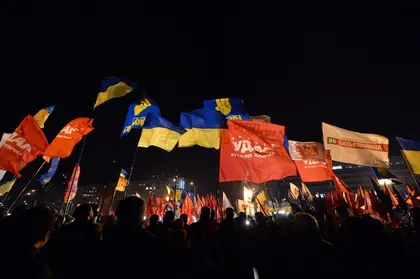The three parties, which include Tymoshenko’s Batkivshchyna
(Fatherland), far-right nationalists and a liberal party headed
by boxing champion Vitaly Klitschko, made their call in a joint
statement in which they grudgingly accepted the results of the
disputed Oct. 28 election.
The opposition’s bold move, in which they swore to defeat
“the regime of Yanukovich”, raised the political temperature on
the eve of a possible resumption on Tuesday of a second trial of
Tymoshenko in the eastern city of Kharkiv.
JOIN US ON TELEGRAM
Follow our coverage of the war on the @Kyivpost_official.
But final election figures show that Yanukovich’s Party of
the Regions seems set to hang on to a majority in the 450-seat
parliament – with the help of traditional allies – and it should
be able to hold the opposition at bay in the new parliament.
The election in the former Soviet republic, mid-way through
Yanukovich’s five-year presidential term, has been criticised as
flawed by international observers.
Despite the international criticism and street protests by
the opposition, the election’s outcome is likely to be used by
Yanukovich as a springboard from which to launch a second bid
for presidential office in 2015.
The three opposition parties, which made a strong showing
and secured 178 parliament seats despite the absence of
Tymoshenko, now appear to have agreed to take up their place in
parliament even though they are still contesting voting in a few
electoral districts.
Yanukovich’s pro-business Regions, which is financed by
wealthy industrialists, says it alone can provide stability in
Ukraine, a major exporter of steel and grain.
The three opposition parties, which include the Svoboda
(Freedom) Ukrainian nationalist party and Klitschko’s UDAR
(Punch), say his rule will extend corruption and cronyism, and
relations with the West will deteriorate further.
The European Union has frozen a free trade agreement with
Ukraine over the Tymoshenko affair.
IMPEACHMENT LAW
In their statement, the opposition parties vowed to work for
a law under which Yanukovich could be impeached – something
which has been actively blocked by Regions deputies in
parliament – and for the resignation of the Yanukovich
government and police and justice chiefs.
Opposition parties – particularly Batkivshchyna and Svoboda
– reproach Yanukovich for signing an agreement with Russia in
April 2010, shortly after he came to power, which extended the
base rights of Russia’s Black Sea fleet in Ukraine’s Crimea
until 2042.
“The resignation of the President, the government and the
state prosecutor: these are our three main political tasks,”
Arseny Yatsenyuk, who heads Batkivshchyna in the absence of
Tymoshenko, told a crowd of about 1,000 opposition supporters on
Monday night.
“The very fact that three political forces have agreed to a
joint start means that the opposition train has set off towards
a new, honest, European country,” Svoboda leader Oleh Tyahnibog
declared to the same crowd in front of the Kiev headquarters of
the central electoral commission.
The opposition also pledged to secure the freedom of
Tymoshenko, 51, who was jailed in October 2011 for abuse of
office after a trial which she said was a vendetta by
Yanukovich, who beat her narrowly for the presidency in February
2010. The West has denounced her case as ‘selective justice’.
Tymoshenko, a leading light in the “Orange Revolution”
protests of 2004-5 which doomed Yanukovich’s first bid for the
presidency, is now on hunger strike in Kharkiv in protest at
what she says was gross electoral fraud by the Regions.
A second trial on equally serious charges of embezzlement
and tax evasion is due to resume against her on Tuesday, though
there is a strong possibility the hearing may be postponed.
Her supporters called on her to end her hunger strike.
“We ask you Yulia: don’t continue your hunger strike ! We
need you strong, alive and healthy,” declared Yatsenyuk to the
crowd on Monday.
Despite the appearance of unity, the three opposition
leaders have differences among themselves which could yet doom
their partnership. Svoboda’s Tyahnibog and UDAR’s Klitschko are
particularly known to be on poor terms with each other.
(Writing By Richard Balmforth; Editing by Andrew Heavens)
You can also highlight the text and press Ctrl + Enter




